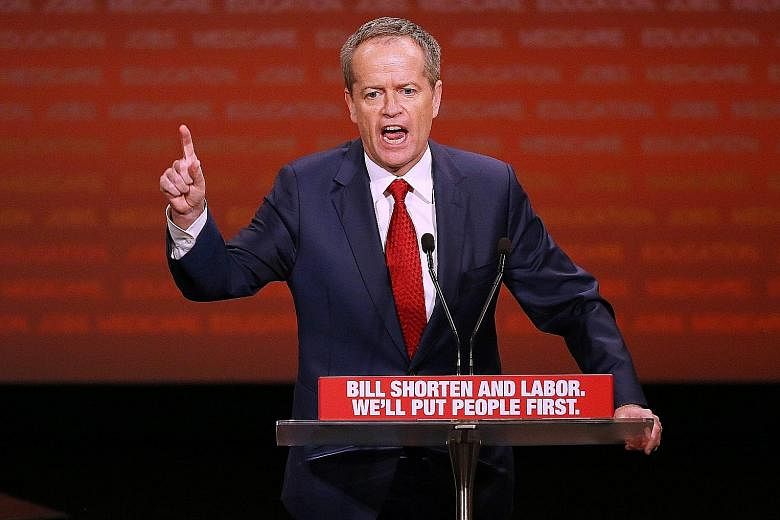Since his days as a high school debating champion in Melbourne - he once famously tore up his notes and ad-libbed his way to victory - Australian Opposition leader Bill Shorten has been tipped as a future Prime Minister.
But few could have predicted the speedy pace - nor the turbulent nature - of his political ascent.
A lifelong Labor party supporter, he completed a combined arts and law degree at Monash University and then began steadily making his way from lawyer to union leader - a traditional path for future Labor politicians.
But he became a household name - almost overnight - in 2006 following a tragic mine collapse in the town of Beaconsfield, Tasmania.
During a frantic two-week effort to rescue two trapped miners, Mr Shorten, then 38, updated the media, consoled worried families, and became the public face of the ordeal.
When the two men were finally rescued, one mass-selling newspaper carried the headline: "Bill for PM". He was widely compared to Bob Hawke, a popular former union leader who was Prime Minister from 1983 to 1991 and is often described as one of Australia's greatest leaders.
Back in 2006, Mr Shorten dismissed the "hype" but admitted he saw himself as a future leader.
"I'd be pleased to be part of a leadership group, but what position that is, you shouldn't get too hung up about," he told an ABC radio interviewer.
"My dream run has been to work with my (union) members and (at) Beaconsfield to share and get involved with all these people… to talk to the families, to be part of them trying to work out what's happened."
A year later, he entered Parliament after the 2007 election and became a Cabinet minister within three years.
After Labor's election loss in 2013 under Mr Kevin Rudd, Mr Shorten became the party's leader.
As Labor leader, he has largely kept the party united, but his prospects of winning the election appeared to plummet last September when the Coalition deposed Mr Tony Abbott in favour of the more popular Malcolm Turnbull.
Mr Shorten was soon being seen as a failure whose ratings as preferred leader were among the lowest in Australian political history.
Now, with the July 2 election just two weeks away, he has overseen a dramatic turnaround and led Labor to a slight lead in the opinion polls. He remains at long odds to win the election and trails Mr Turnbull as preferred prime minister, but his approval ratings have gradually risen from 33 to 43 per cent since March.
The turnaround has been credited to his surprising willingness to adopt ambitious - and potentially unpopular - policies. These included curbing tax breaks for property investors and setting ambitious carbon emissions reduction targets.
Yet, aside from his rapid ascent, little else about Mr Shorten or his life has remained consistent or predictable. He is said to have inherited his passion for the Labor party from his father, a dock worker and union official, and his intellectual curiosity from his mother, a teacher, academic and lawyer.
Perhaps due to this parental mix, he seems as comfortable mixing with workers in a pub as with corporate leaders in a boardroom.
He is a seasoned debater, yet is also capable of cringe-worthy political one-liners which have become known as "zingers" - as they were dubbed by a local comedian.
Despite being staunchly pro-Labor and pro-union throughout his life, he attended an exclusive Catholic school and his first wife was the daughter of a former Liberal MP.
Years later, ahead of his second marriage to Ms Chloe Bryce, the daughter of a Labor-appointed former Governor-General, he converted from Roman Catholicism to Anglicanism. The couple have a daughter and two stepchildren from his wife's first marriage.
It is little surprise that he was once described as a "shapeshifter" by The Age newspaper.
But his best-known changes of heart have been political.
In 2010, he was the most prominent of the so-called "faceless men" - the backroom Labor operators who helped to swiftly oust Mr Rudd in favour of Ms Julia Gillard. It was a brazen act of political treachery by a party powerbroker who had been seen as a loyal backer of Mr Rudd.
Yet just three years later, he was at it again, switching his allegiance from Ms Gillard to Mr Rudd during a leadership challenge ahead of the 2013 election.
"I understand that this position may come at a personal cost to myself," he told reporters.
On both occasions, Mr Shorten, confronted by Labor's poor standing in opinion polls, insisted he was acting in "the best interests of the Australian nation and the Labor party".
The episodes have perhaps been forgiven by voters because his rival Mr Turnbull has also performed a political execution.
If the opinion polls prove correct, Labor could lose the election in two weeks, but significantly reduce the Coalition's majority.
Commentators believe such a result could allow Mr Shorten to survive as Labor leader and give him a second chance at fulfilling his lifelong ambition at the next election in three years.
Jonathan Pearlman


